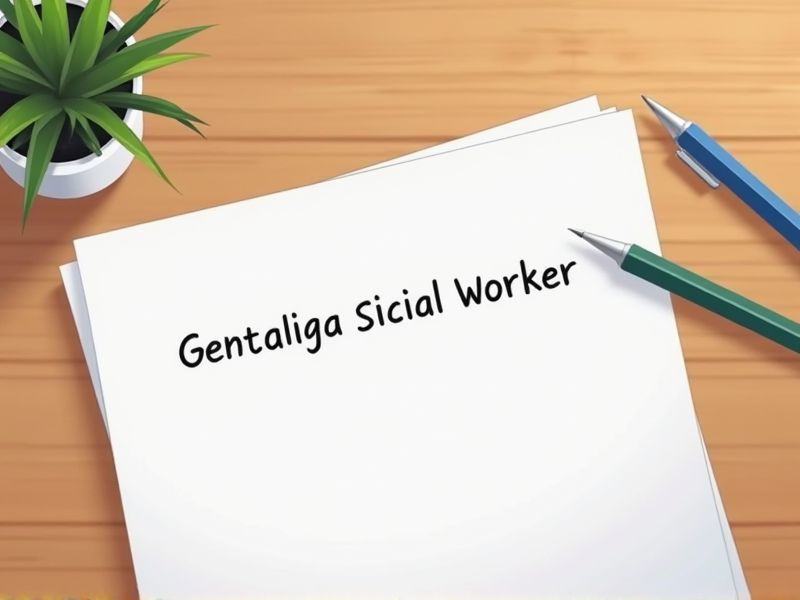
Gerontological Social Workers face complex challenges associated with the aging population, requiring specialized skills to address diverse elder care issues. Certifications in this field ensure these professionals possess comprehensive knowledge in gerontology and social work principles. They validate the ability to provide high-quality, sensitive care tailored to the unique needs of older adults. Explore some essential certifications relevant for a Gerontological Social Worker.
Licensed Clinical Social Worker (LCSW)
The aging population is increasing, leading to a higher demand for professionals with expertise in the social and emotional challenges faced by older adults. Licensed Clinical Social Workers (LCSWs) are equipped with advanced skills necessary for assessing and addressing complex mental health issues in the elderly. Their training allows them to provide therapy and supportive interventions, which can improve the quality of life for seniors. LCSWs also advocate for older adults, navigating healthcare systems and accessing community resources to meet clients' needs efficiently.
Certified Gerontological Social Work Specialist (CGSWS)
The aging population is projected to double by 2050, increasing the demand for specialized care, making the Certified Gerontological Social Work Specialist (CGSWS) essential for quality service delivery. Expertise in gerontology improves the ability to address complex aging issues, thereby enhancing outcomes for older adults. Certification signifies a commitment to the highest standards of care, leading to increased trust from clients and employers. Specialized training equips professionals with advanced knowledge, allowing them to develop more effective care plans tailored to the unique needs of elderly clients.
Board Certified-Geriatric Social Worker (BCGSW)
The aging population's unique needs create a demand for specialized knowledge, which a Board Certified-Geriatric Social Worker (BCGSW) provides. Certification ensures professionals possess the necessary skills to address complex issues like cognitive decline, elder abuse, and chronic health conditions. This specialized expertise facilitates improved care management and resource allocation for older adults. BCGSW certification validates a social worker's commitment to best practices in gerontological care.
Certified Social Work Case Manager (C-SWCM)
Gerontological Social Workers often face complex cases with older adults, who may have multifaceted needs that require coordinated care. A Certified Social Work Case Manager provides specialized skills in comprehensive assessment and care planning, essential for addressing these intricacies. With the growing aging population, the demand for efficient allocation of resources and personalized care plans becomes crucial, which a C-SWCM is trained to manage. The certification ensures adherence to best practices and ethical standards, enhancing the quality of service delivered to elderly clients.
Certified Hospice and Palliative Social Worker (CHP-SW)
The need for Certified Hospice and Palliative Social Workers (CHP-SW) for Gerontological Social Workers arises because of the increasing aged population and the complexities in end-of-life care. Specialized knowledge in palliative care equips social workers to provide holistic support tailored to seniors facing life-limiting conditions. Knowledgeable interventions help ensure the emotional, psychological, and social needs of elderly patients and their families are comprehensively addressed. Certification assures quality care that aligns with ethical standards and best practices in a highly sensitive field.
Certified Aging-in-Place Specialist (CAPS)
Gerontological Social Workers focus on enhancing the quality of life for older adults, and CAPS certification provides them with essential training to modify homes for safe and independent living. The aging population often faces mobility and accessibility issues; CAPS specialists design environments that mitigate these challenges. Effective collaboration between CAPS professionals and social workers can lead to improved client outcomes. Understanding the specific needs of aging clients ensures social workers provide more comprehensive and personalized care plans.
Certified Clinical Mental Health Social Worker (CCMH-SW)
Certified Clinical Mental Health Social Workers (CCMH-SW) bring specialized expertise in mental health, which is crucial for addressing the complex emotional and psychological needs of the elderly population. The aging process often involves challenges such as coping with loss, depression, and anxiety, which require targeted interventions that CCMH-SWs are equipped to provide. Their advanced training in assessment and therapy significantly enhances the quality of care for older adults, promoting better mental health outcomes. Improved mental health care for the elderly reduces overall healthcare costs and enhances the quality of life, reinforcing the necessity of CCMH-SWs in gerontological settings.
Certified Medical Social Worker (CMSW)
An increasing aging population creates a higher demand for specialized support, requiring a Certified Medical Social Worker (CMSW) for effective gerontological social work. CMSWs possess specific medical knowledge that aids in addressing complex health-related issues faced by older adults. Guidelines and ethical standards maintained by CMSWs ensure comprehensive and sensitive care for the elderly. Their expertise in coordinating care among healthcare providers improves outcomes and enhances elderly individuals' quality of life.
Certified Community Social Work Specialist (CCSW)
Certified Community Social Work Specialists (CCSW) provide essential expertise in managing complex social issues, making them invaluable for gerontological social work, which often deals with multifaceted problems in aging populations. Their certification ensures a standardized level of knowledge, which aids in effectively advocating for the rights and needs of older adults. Having a CCSW can improve coordination with healthcare providers and community resources, leading to more comprehensive care plans for elderly individuals. They also bring a structured approach to addressing mental health, social isolation, and family dynamics, all crucial aspects in gerontology.
Certified Trauma Social Work Specialist (CTSW)
A Certified Trauma Social Work Specialist (CTSW) is crucial for gerontological social work because older adults often experience trauma related to loss, illness, or abuse. Trauma can exacerbate existing health issues, making specialized intervention vital. CTSWs possess training that helps address these complex psychological needs, improving elderly care outcomes. Access to a CTSW can enhance the quality of life for seniors, ensuring they receive holistic and empathetic support.
Summary
By obtaining certifications, you as a gerontological social worker can enhance your professional credibility. This improvement often leads to better career opportunities and advancement possibilities. Certification equips you with specialized skills and knowledge, leading to improved care for older clients. As a result, you may experience increased job satisfaction and positive impacts on client outcomes.
